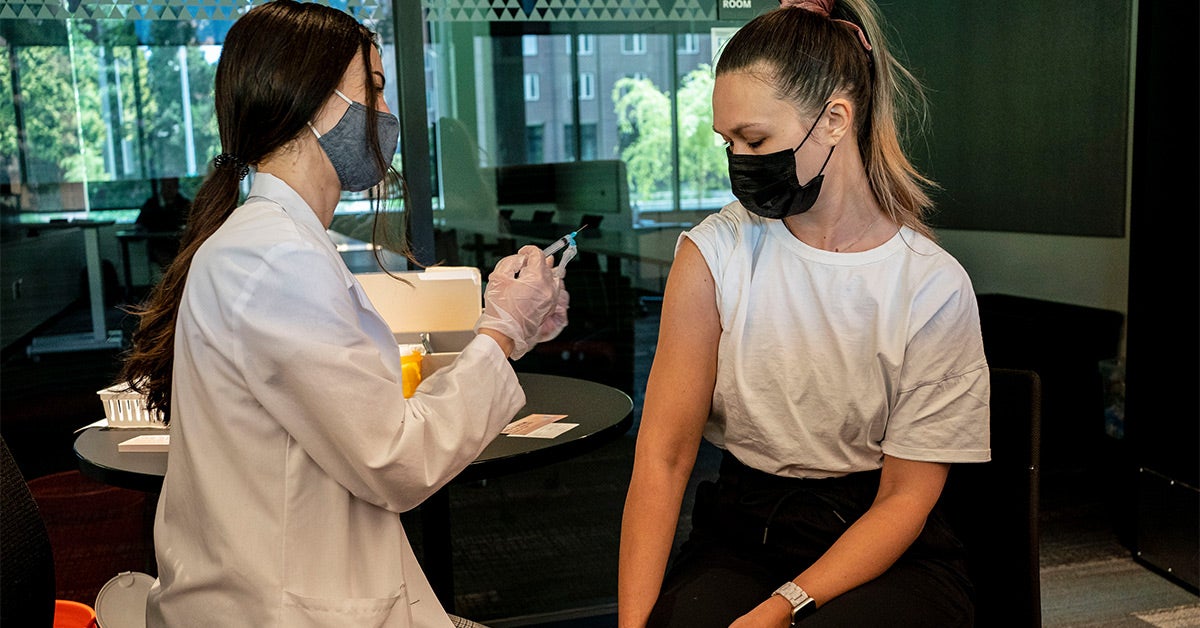[ad_1]
- Misinformation about COVID-19 vaccines has raised concerns among some that the injections could affect their fertility, despite no evidence that this is possible.
- A
investigation conducted in the UK found that around a quarter of young women did not want to be vaccinated because of concerns about their fertility. - If you have any concerns about vaccines, talk to your doctor. They will be able to explain how vaccines work and how there is no link between the vaccine and infertility.
Misinformation about the ability of COVID-19 vaccines to impact fertility has been circulating on the internet since the vaccine’s launch in December 2020.
Over the past few weeks, the spread of misinformation about the COVID-19 vaccine has accelerated, with people sharing unreliable links, memes and videos claiming the vaccine may harm teenage fertility.
There is no link between vaccines and infertility, health experts say.
The Society for Maternal-Fetal Medicine and the American College of Obstetricians and Gynecologists (ACOG) have both recommended that pregnant people have access to COVID-19 vaccines.
ACOG emphasizes that vaccine studies do not indicate any safety concerns.
The
During clinical trials, several people became pregnant, suggesting that the vaccines do not cause infertility, said Dr José Mayorga, executive director of the Health Family Health Center at the University of California at Irvine and assistant clinical professor of family medicine at the UCI. Medicine School.
More … than
Research done on more than 35,000 pregnant people who received the COVID-19 mRNA vaccines found that there was no evidence that the vaccines affected or harmed pregnant people, and there is no evidence that injections harm the baby or the pregnancy.
The study authors say follow-up should continue with these parents and children to verify the safety of the vaccine.
In December 2020, a German doctor named Dr Wolfgang Wodarg expressed concern about a protein included in messenger RNA (mRNA) vaccines that appeared similar in structure to syncytin-1 – a protein that helps the placenta to develop during pregnancy.
Since the spike protein and syncytin-1 share small pieces of genetic code, fear has circulated that the vaccine could trigger an immune response that attacks the placenta, despite no evidence of this.
Wodarg has made misleading claims in the past, according to the Poynter Institute. They reported that he had declared the new coronavirus to be harmless in 2020 despite all evidence to the contrary.
However, after Wodarg’s concerns were made public, there were concerns that the genetic material included in the vaccines could enter the host’s genome and alter their DNA, even if that is not possible.
People have taken to social media to spread these false claims, causing vaccine hesitation in some people who intend to become pregnant.
In a
The misconception that vaccines can cause infertility is not new.
“In 2003, there were serious concerns about the polio vaccine in Nigeria. A similar thing happened with the HPV vaccine. Both are safe and have no effect on fertility, ”said Dr. Christine Metz, professor at the Feinstein Institutes for Medical Research in Manhasset, New York.
According to Mayorga, there is also a misconception that mRNA vaccines are a new technology.
“This is far from the truth. The mRNA vaccine has been studied for decades” to fight diseases like influenza, rabies, Zika virus and even cancer, Mayorga said.
“There is absolutely no evidence that vaccines, and in particular COVID-19 vaccines, have an impact on fertility,” said Dr Jill Rabin, OB-GYN and professor at the Feinstein Institutes for Medical Research in Manhasset , New York.
Rabin recommends COVID-19 vaccines for pregnant patients, who plan to become pregnant in the future, and who are breastfeeding.
The mRNA coronavirus vaccines train our cells to make a protein or part of a protein which then triggers an immune response. It is this immune response that produces antibodies and protects us from viral infections.
This genetic material is discarded once our immune system has been activated.
According to Metz, mRNA is not stable. It does not replicate or reproduce and is quickly degraded by the body.
“Once our muscle cells make the advanced protein, the instruction manual is ‘thrown away’ or degraded. It does not stay and, more importantly, does not enter the special place in our cells where our DNA resides, ”Mayorga said.
Doctors and healthcare professionals are on a mission to share real, verified scientific information with patients and assure them that there is no evidence that vaccines can lead to loss of fertility, Rabin said.
COVID-19 can be a fatal disease with serious short and long term health consequences. However, the reactions and side effects caused by vaccines are manageable.
“My advice to teens and parents concerned that the vaccine might impact fertility delivery is to reassure them that the science doesn’t show it,” Rabin said.
Mayorga said he made himself available to address these types of myths and answer his patients’ questions about vaccines.
Mayorga shared videos and drew pictures of what goes into the body after being vaccinated.
He also hosted a seminar for teens interested in COVID-19 vaccines. During the conference, he answered their questions, explained how mRNA vaccines work and talked about the benefits of vaccination.
“Thinking back on that conference, I realized that as physicians we must continue to approach each patient differently and try different tactics to help educate, empower and debunk the myths that are circulating,” Mayorga said.
If you have any concerns about vaccines, talk to your doctor. They will be able to explain how vaccines work and how there is no link between the vaccine and infertility.
Misinformation regarding COVID-19 vaccines and their ability to impact fertility has been around since the vaccine’s deployment.
Despite these misconceptions, scientists continue to assure people that there is no link between COVID-19 vaccines and infertility.
To combat the worries, healthcare professionals try to teach people how vaccines work and hold seminars to address some of the most common myths and misconceptions about vaccines.
[ad_2]

